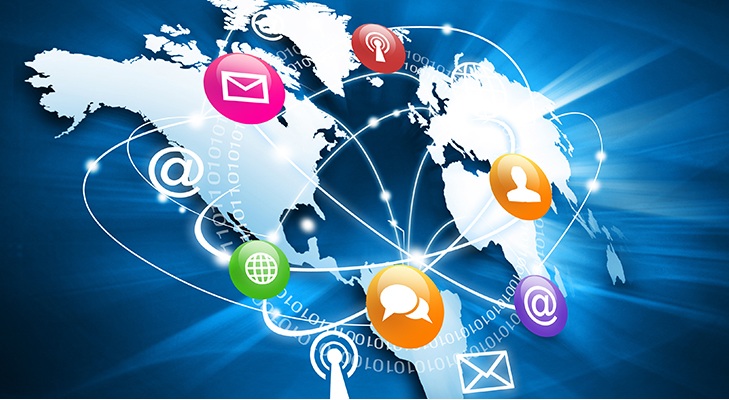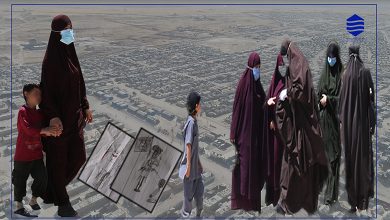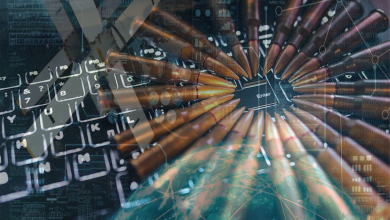
The Digital Revolution and the Electronic Empire
Eng. Ibrahim Hussain Ahmed
Humanity has gone through numerous stages in its historical evolution, and in each stage of development, there were brilliant minds working and creating. Among these developments that brought about radical changes in the course of human evolution are the scientific revolutions that had a profound impact on all aspects of life within human societies and on the trajectory of their historical development. The Industrial Revolution, which occurred during the 19th century and was witnessed in Western European countries due to the comprehensive scientific resurgence that led to important inventions and discoveries, could be one of the most significant of these revolutions. It replaced manual labor with machinery. This had a profound impact on economic, social, and political life, both in Europe and beyond its borders.
The current technological revolution, particularly in the digital realm, constitutes an advanced stage of those scientific revolutions. These revolutions take on different trajectories in each period, based on advancements in their means and global circumstances. It’s worth mentioning that this revolution, and its resulting outcomes, are significantly affecting many aspects of life within human societies, especially in developed countries. They are used to influence public policies and their tools in economic, political, and social realms.
The digital revolution has shifted humanity from mechanical technologies to digital electronics, which began in the latter half of the 20th century. Subsequent developments have continually progressed these technologies, resulting in their current state. These technologies have taken forms that directly impact social, economic, and even political aspects of life.
The evolution of social media
No one anticipated that social media platforms like Facebook, Twitter, WhatsApp, and others would develop to this extent, becoming some of the most influential tools globally. The current lifespan of these platforms is relatively short when compared to the overall technological advancement, as they practically emerged after the year 2000.
These platforms have infiltrated the internet across various countries, effectively turning the world into a small village. They allow you to connect with friends and relatives no matter where they are, starting from Facebook and extending to even the least utilized applications in this domain.
Initially, their impact was limited to individuals, and the idea that their influence would extend to governments, leaders, and nations wasn’t prevalent at the time. However, this changed around the beginning of 2011. The Arab Spring revolutions cannot be mentioned without discussing the impact of social media. Facebook, for instance, played a significant role in toppling certain presidential regimes, like the Egyptian government. It became a way for dissidents to communicate and for those opposed to their governments to organize. The role of social media continued to shift from raising awareness on the streets to disseminating awareness electronically. It has become a platform for all activists, be they political figures, civilians, or others, to voice their opinions and make them accessible to everyone. This allowed political and social elites to transcend the traditional public domain typically controlled by the state.
In Iran, when the fuel protests began in 2019, the Iranian government blocked all foreign social media platforms, claiming they were inciting chaos and destruction. This indicates their recognition of the significant role these platforms play in expanding the scope of protests within the country, as well as their role in conveying internal events to the outside world. Consequently, the Iranian government chose to block social media sites with the aim of isolating the Iranian people entirely from their international surroundings.
The Impact of Social Media on Political Life (The Trump Incident as an Example)
The beginning of 2021 marked a new shift in the impact of these platforms, especially after the well-known platform Twitter suspended the account of former U.S. President Donald Trump due to several tweets that were interpreted as inciting violence. This was followed by his supporters storming the U.S. Capitol on January 6, 2021. Subsequently, bans extended to platforms like Facebook, Instagram, and others, affecting more than ten sites.
The suspension of the U.S. President’s account can be viewed from several angles. Firstly, it represents a form of democracy granted to these corporations, which through their decisions managed to suspend and close the account of the president of the world’s most powerful nation. These developments added a democratic aspect, or another seed, to solidify democracy in all countries around the world. It became a lesson, teaching rulers that no one is above the law.
The second angle is the argument that suspending the account is a step towards suppressing freedoms and freedom of expression in general, regardless of the content of the tweets. There are thousands who violate humanitarian standards worldwide, and they don’t need tweets to engage in killing and inciting violence. Some of them are rulers of countries who exercise their dictatorships in full view of the world, without any accountability, and without posting that on social media platforms. If a U.S. President, who has the authority to order a nuclear attack, can’t be trusted with a Twitter account, how can others?
The third angle revolves around the extent of these companies’ direct influence. Regardless of the tweets from the U.S. President that caused all of this, these companies now control matters that lead to fundamental changes. Recently, the fate of accounts of other leaders has come to light. Since social media is widespread globally, it has taken on an electronic imperial character. It has become capable of influencing any country beyond its corporate boundaries. The suspension of Twitter accounts linked to Iran’s Supreme Leader Ali Khamenei after he posted an inciting tweet, as claimed by the company, and the blocking of a tweet by the Turkish Minister of Interior Süleyman Soylu, indicate that these platforms are becoming more like remote-controlling empires.
“This raises a significant question about the editorial judgments of social media companies and the way they regulate their operations,” as mentioned by Matt Hancock, the British Health Secretary. He questions whether it’s appropriate to leave such decisions in the hands of individuals like Mark Zuckerberg, the CEO and founder of Facebook. Hancock believes that this should not be left entirely to them, and there’s a need to establish a regulatory framework around them to set rules and move forward. The most important question to be asked is whether such decisions should really be in the hands of a single person.
In this context, it’s not surprising that some countries are paying attention to the influence of this empire. They might lead them to use local social media platforms and tools. What recently happened in Turkey is a close example of this. The team of Turkish President Recep Tayyip Erdogan and the Ministry of Defense switched to using the encrypted messaging app “Bip,” a unit of the Turkish company Turkcell, due to WhatsApp’s new policies. Erdogan called on the Turkish people to use this messaging app, and more than a million new users joined it in just one day.
What happened in Turkey might not be just about new WhatsApp policies; it could be about liberating from the empire of social media. This trend could extend to other countries as well. China has long imposed restrictions on more than 75% of global social media sites, such as Google, Facebook, and WhatsApp, not only due to the events of early 2021 but also out of concerns about surveillance and espionage. Thus, they’ve provided secure alternatives to these platforms.
In the past, individuals feared the power of social media, and now it has reached the level of heads of states. Will we witness further developments on this front? All of this could be linked to institutions working in secrecy that control the world as a whole, influencing companies and even countries according to their directions and ideologies.
The COVID-19 Pandemic and the Rise of Digital Currencies (With Bitcoin as an Example)
One of the means of electronic empire is the apparent emergence of cryptocurrency. One of the most prominent digital currencies on the rise now is Bitcoin. It’s a decentralized digital currency invented in 2008 by a person using the pseudonym Satoshi Nakamoto, who remains unknown to this day. Bitcoin usage began in 2009, and it’s the first decentralized digital currency without a central bank. It can be sent from one person to another through the Bitcoin network in a peer-to-peer manner without the need for intermediaries[1] like banks, insurance companies, exchange companies, and brokerage clients. It can be exchanged for other currencies, products, and services.
Estimates from research conducted by the University of Cambridge indicated that in 2017, there were between 2.9 to 5.8 million users using digital currency wallets, with Bitcoin being the most widely used. Like any other currency, Bitcoin consists of smaller units called “satoshis.” It takes 100 million satoshis to obtain one Bitcoin. Approximately 360 new Bitcoins are issued daily worldwide, bringing the current total to around 16.5 million units (coins). The first Bitcoin ATM was installed in Vancouver, British Columbia, Canada, in 2013, allowing users to buy or sell digital currencies.
As mentioned earlier, the Bitcoin network has been operational since 2009 and hasn’t stopped since then. Due to its consensus mechanism[2], no one has been able to breach the Bitcoin blockchain. Most breaches occur due to human errors in wallet management, rather than flaws in the design.
The global spread of the COVID-19 pandemic had a significant impact on people’s reliance on digital currencies, with the rise of Bitcoin being one of its consequences. During the pandemic’s outbreak, digital purchases and transactions increased, and moving away from traditional cash transactions became a necessary measure to prevent the spread of COVID-19.
During this period, many changes have occurred that have supported this currency. One significant development was when the online payment giant, PayPal, introduced the service of buying, selling, and paying with cryptocurrencies. This move allows its 350 million users and millions of partner merchants to convert payments from Bitcoin or Ethereum[3] into local currency, making virtual currencies more popular.
The announcement by PayPal to allow its customers to use cryptocurrencies for transactions marked a significant leap for Bitcoin. This move increased the demand for Bitcoin, leading to a rise in its price. One of the factors that boosted Bitcoin’s value was Jack Dorsey, the founder of Twitter, launching a foundation to make Bitcoin the “currency of the internet.” Additionally, Elon Musk, the CEO of Tesla, invested around $1.5 billion in Bitcoin, further bolstering its reputation. Musk didn’t stop there; he recently enabled customers to purchase Tesla electric cars using Bitcoin.
Back on June 6, 2011, Bitcoin was valued at only $8. Despite the skepticism at that time due to the global economic crisis, most experts considered cryptocurrencies to be an unrealistic revolutionary dream due to their volatile value. However, the situation has changed today. Bitcoin has become a hot topic in the economic world, trading at over $50,000 per coin out of the total 21 million available units[4]. Despite its significant value fluctuations, Bitcoin has captured the world’s attention in these days.
Despite all the skepticism surrounding Bitcoin, it has succeeded in persisting and proving its ability to remain in circulation for 12 years. Despite not being more efficient or user-friendly than traditional paper currencies, it has remained adaptable and capable of challenging fiat currencies. This has led investment companies to strongly gravitate towards it in recent times.
As for the impact of Bitcoin on the dollar, experts say that it is almost impossible for Bitcoin or other digital currencies to replace the US dollar as a global reserve currency, at least in the short term. This is due to its price volatility and extremely limited supply, making it unsuitable for such a role. The same applies to other digital currencies like “Dogecoin,” which started as a joke in 2013 but now has a total market value of around $6.9 billion, at a rate of 5 cents per unit. However, this doesn’t mean that digital currencies have no impact on the dollar, and it seems that the future holds significance for these digital currencies, which could be a crucial part of the digital empire shaping the world.
Digital Currencies and the Global Financial System
Digital currencies, especially Bitcoin, somewhat resemble what conspiracy theorists have talked about – a global currency controlled by a select elite of financiers. An article titled “Get Ready for a World Currency” was published in The Economist not a few days ago, but on September 1, 1988, about 33 years ago. The article started with the sentence: “Thirty years from now, Americans, Japanese, Europeans, and people in many other rich countries, and some relatively poor ones, will probably be paying for their shopping with the same currency. Prices will be quoted not in dollars, yen, or D-marks but in, let’s say, the phoenix.”
Of course, the phoenix currency was speculative at that time, but what is happening today seems to be an actualization of a scientific imagination from over three decades ago. Some believe that the emergence of these currencies is not a mere innocent coincidence; there might be deliberate intentions behind it.
Digital currencies are not subject to governmental authority or any global system. They are driven by buying, selling, and trading. Therefore, you won’t need currency exchange, won’t be subject to banks, and won’t pay any fees. This negates the concept of centralization and control over the movement of funds, stocks, real estate, and more. It becomes difficult to monitor the flow of funds and know their destinations, and this secrecy in transactions has attracted many seeking privacy and liberation from the control of banks. Although these currencies could become a safe haven for tax evaders, money launderers, and other illegal activities, they possess enough power to undermine state authority and control markets. An investigative study conducted by the U.S. Federal Reserve about Bitcoin in late 2017 led the Chairman of the Federal Reserve, Jerome Powell, to identify privacy as one of the major risks of digital currency.
Therefore, we observe serious attempts from many governments and banking systems to combat digital currencies. They now seem inclined to issue centralized digital currencies, such as Ripple, through which they can modify some of their financial rules, but without losing control over markets and the movement of funds.
Some countries have managed to benefit from digital currencies, especially those facing economic blockades like Venezuela or those under international sanctions like North Korea. The Venezuelan government, for instance, introduced a centralized digital currency called the Petro, linking its value to the price of local oil barrels and precious metals. According to their statements, this government succeeded in selling over $700 million worth of Petro during the initial subscription period. This provides Venezuela with a way to escape the economic pressures that have greatly inflated its local currency. Despite American pressure and restrictions on purchasing the Venezuelan digital currency, this situation favors the new digital currency. It poses a threat to the global economic system as a whole and allows governments to step out from under the dominance of the US dollar and the United States.
The Philosophy of Digital Currencies and War Financing
Some believe that digital currency technology will inevitably change the world and reduce wars by replacing traditional currency and dominating economic life.
Philosopher Stefan Molyneux says, “Bitcoin has the power to undermine political authority that seems to be absolute, like the most peaceful revolution that could happen in this world.”
Historically, governments’ ability to print money has been a primary means of funding wars. Wars often pushed governments to print money incessantly. For example, during World War I, it was expected to last only a few months because that’s how long the allocated war funds were supposed to last for participating countries. However, instead of adhering to the international gold standard, these countries began printing new currency to continue funding the war effort. Similar situations occurred during the Vietnam War, where the United States printed massive amounts of dollars without gold backing, leading to currency inflation in the 1960s.
Experts affirm that “War and limited currency don’t go together.” As long as digital currencies remain outside government control, they will remain limited. If they become global, then they will curb wars.
Conclusion
The world is in constant change, and as previously stated, the only constant in life is continuous change. The digital revolution is one of the changes that could bring unforeseen leaps to the world, just as the Industrial Revolution did, granting humanity a tremendous leap in technological advancement. What was once science fiction a hundred years ago is now reality. Today’s discussions about digital currencies and other tools of the digital revolution being mere speculative bubbles or economic bubbles might very well turn the tables in the future, including challenging governments and even the global system as a whole.
References:
- Industrial Revolution – Encyclopedia of Knowledge.
- Fourth Industrial Revolution – Al Arabiya website – Published on July 1, 2018.
- What is Bitcoin? – Official website.
- “Twitter” sanctions Iranian Supreme Leader Ali Khamenei – Al Ain News website – Published on January 22, 2021.
- “Twitter” blocks tweet by Turkish Interior Minister due to “homosexuality” – Turkey Now website – Published on January 31, 2021.
- Trump’s social media ban: Necessity for security or restriction of freedoms? – BBC Arabic website – Published on January 14, 2021.
- Bitcoin breaks record numbers – Al Sabah website – Published on January 11, 2020.
- How did Bitcoin establish itself in companies in 2020? What are the factors of its rise? – Al Jazeera website – Published on December 23, 2020.
- Twitter CEO launches foundation to make “Bitcoin” the “Internet currency” – Al Arabi Al Jadid website – Published on February 13, 2021.
- Tesla invests billions in Bitcoin and revives it – Sky News Arabia website – Published on February 8, 2021.
- Prosperity of Bitcoin.. Does it pose a threat to the dollar? – Al Jazeera website – Published on February 22, 2021.
- Bitcoin.. Economic bubble or digital revolution? – Lelam website – Published on January 23, 2018.
- Why does the global financial system fight digital currencies? – Al Jazeera website – Published on July 17, 2018.
- Now.. Buying Tesla cars using Bitcoin – Sky News website – Published on March 24, 2021.
- Bitcoin.. The currency of the new global system – Al Bayan website – Published on January 17, 2018.
- Bitcoin: A new global system.. – Center for Strategic Research and Studies Links – Published on February 17, 2017.
[1] For example, if you go to a retail store and purchase a piece of clothing, and you make the payment using a credit card (Visa or MasterCard), the bank serves as the intermediary between you and the seller. Even if you make a cash payment, the central bank is still the intermediary, as it is the issuer of the circulating currency. However, if you use digital currency like Bitcoin, when you buy the clothing item, you pay through a digital wallet stored on your mobile phone, and the seller has a machine similar to a credit card payment machine. You make the payment directly to the seller. Once the transaction is completed, ownership of the digital currency shifts from your wallet to the seller’s wallet, and this change of ownership is quickly propagated across computer networks worldwide in a decentralized manner through a technology called Blockchain. This means there is no central computer or bank performing the transaction, nor are they aware of the transaction’s parties. Ownership changes without revealing who the seller and buyer are.
[2] Consensus Algorithm: It works to confirm adherence to protocol rules and ensures that all transactions occur in a trusted manner, preventing the spending of currency more than once.
[3] Ethereum was first launched in August 2015, joining the realm of cryptocurrencies. It’s the second most popular and valuable digital currency in the world after Bitcoin. Since its launch, Ethereum has experienced rapid growth and development. Its market price has surged from $2.8 at the time of launch to $1,678 recently. During this time, many other digital currencies have not been able to achieve the same level of fame and adoption, even though they were launched around the same time.
[4] Similar to any currency, including Bitcoin, there are limitations to printing or issuing Ethereum in order to mitigate the risk of inflation.





